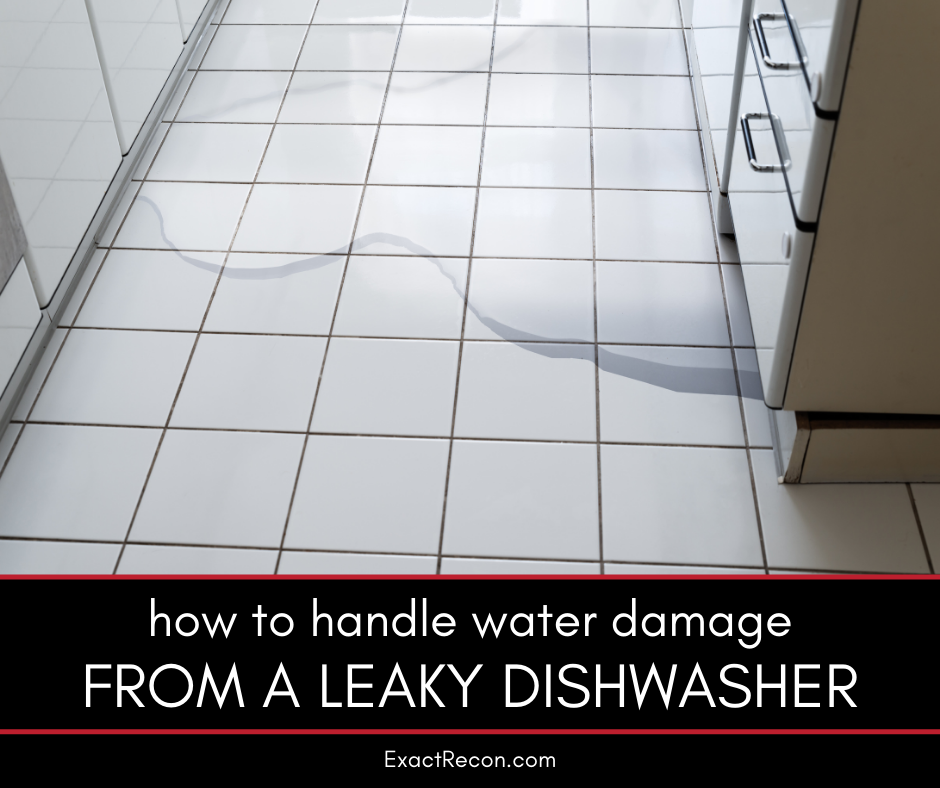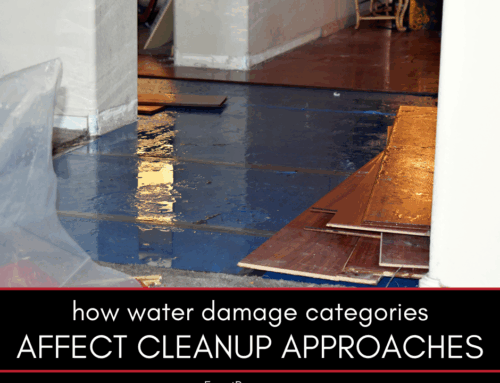A leaky dishwasher might seem like a small problem, but it can lead to significant water damage if not addressed immediately. Water leaking from your dishwasher can seep into floors, cabinets, and walls, causing long-term structural and health issues. This guide explains what to do about water damage from a leaky dishwasher and how to prevent future leaks.
What to Do About Water Damage From a Leaky Dishwasher
Addressing water damage from a leaky dishwasher quickly is essential to minimize damage and prevent complications. This guide covers:
- Identifying the source of the leak
- Stopping the water flow
- Assessing and cleaning the damaged area
- Preventing mold growth
- When to call Exact Recon for professional restoration services
Here’s a closer look at each.
Identifying the Source of the Leak
The first step in addressing a leaky dishwasher is finding the source of the water. Common causes include:
- Damaged door seals: Worn or cracked seals around the dishwasher door can allow water to escape during a cycle.
- Clogged or damaged drain hose: A blocked or leaking drain hose may cause water to back up and spill out.
- Faulty water inlet valve: If the valve supplying water to the dishwasher is damaged, it can lead to overfilling and leaks.
- Improper installation: A poorly leveled or incorrectly installed dishwasher can result in uneven water distribution and leakage.
Inspect your dishwasher carefully to pinpoint the issue. If you’re unsure about the source, consult the appliance’s user manual or a professional repair technician.
Stopping the Water Flow
Once you’ve identified the leak, take immediate action to stop the water flow. Turn off the dishwasher and shut off the water supply to prevent additional leaks. If water is pooling around or underneath the dishwasher, use towels or a wet/dry vacuum to remove it. Carefully pull the dishwasher away from the wall to access the area beneath it and clean up hidden water.
Be cautious when moving the dishwasher to avoid damaging your floors. If the water has reached electrical components, consider shutting off power to the area to eliminate the risk of electrical hazards.
Assessing and Cleaning the Damaged Area
After stopping the water flow, assess the extent of the damage. Check the surrounding flooring, walls, and cabinets for signs of water damage, such as discoloration, warping, or swelling. Look for moisture in hard-to-reach areas, as water can seep into cracks and crevices.
Begin the cleanup process by thoroughly drying the area. Use fans and dehumidifiers to speed up drying and prevent moisture from lingering. For minor damage, this may be sufficient. However, if water has penetrated deeply into materials like wood or drywall, professional restoration may be necessary.
Preventing Mold Growth
Mold thrives in damp environments and can begin to grow within 24 to 48 hours after water exposure. To prevent mold growth, ensure all affected areas are completely dry. Clean surfaces with an antimicrobial solution to eliminate any potential spores.
Pay special attention to areas under the dishwasher and behind baseboards, as these spaces are particularly vulnerable to mold. If you notice a musty smell or visible mold growth, contact a professional for remediation to ensure the problem is fully addressed.
When to Call Exact Recon for Professional Restoration Services
If the water damage is extensive or you’re unable to fully dry the affected area, it’s time to call the experts at Exact Recon. We specialize in water damage restoration and can handle everything from water extraction to mold remediation and structural repairs.
Our team uses advanced equipment to detect hidden moisture and ensure thorough drying, preventing further damage and ensuring your home is safe. We also work with your insurance company to streamline the claims process, giving you peace of mind during a stressful time.
FAQ About Water Damage From a Leaky Dishwasher
Check out these commonly asked questions about handling water damage from a leaky dishwasher. If you don’t see your question here, please call our office and we’ll find you the answers you need.
What Causes a Dishwasher to Leak?
Dishwashers can leak due to damaged door seals, clogged or cracked drain hoses, faulty water inlet valves, or improper installation.
How Quickly Should I Address a Dishwasher Leak?
You should address a dishwasher leak immediately. Delaying action increases the risk of structural damage, mold growth, and higher repair costs.
Can I Fix a Dishwasher Leak Myself?
Minor issues, like cleaning a clogged drain hose or replacing a door seal, can often be handled with DIY methods. However, significant leaks may require professional repairs or restoration.
Does Insurance Cover Water Damage From a Leaky Dishwasher?
Many homeowner’s insurance policies cover sudden and accidental water damage, including leaks from appliances like dishwashers. Check your policy or consult with your provider for details.
How Can I Prevent Future Dishwasher Leaks?
To prevent future leaks, regularly inspect and clean the dishwasher’s door seals, hoses, and valves. Ensure the appliance is level and follow maintenance recommendations in the user manual.
By acting quickly and enlisting professional help when needed, you can address water damage from a leaky dishwasher and prevent further issues. Trust Exact Recon to restore your home and provide peace of mind.
Do You Need a Disaster Remediation Expert in Washtenaw County or Jackson County?
If your home has already been damaged, we can help. Check out our services and get a free disaster remediation quote today. We offer:
- Water damage restoration
- Fire damage restoration
- Mold removal and remediation
- Fire and smoke restoration
- Sewer cleanup and disinfecting
- Reconstruction
- Wind and storm damage repair










